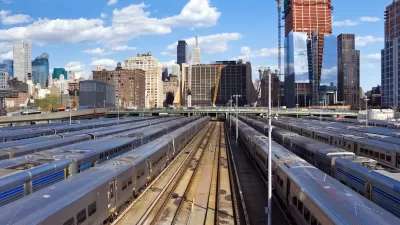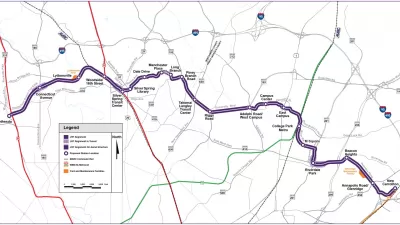In the the first of a 2-part series on transit and gentrification, WAMU's Martin Di Caro reports on the rapidly developing (and gentrifying) Georgia Avenue corridor in Washington D.C.
Peter Tatian, having lived in D.C. for over 25 years, describes the changes to the Shaw and Pleasant Plains neighborhoods as extraordinary. "I remember when that part of town was considered off limits by many people, that you wouldn't want to even go there. And now it's become one of the priciest areas," says Tatian, a senior researcher at the Urban Institute.
Resident Sylvia Robinson welcomes many of the improvements to the area, and while she does not wholly oppose the economic and demographic shifts her neighborhood has undergone, she says:
"I consider gentrification an attitude. It's the idea that you are coming in as a planner, developer, or city agency and looking at a neighborhood as if it's a blank slate. You impose development and different economic models and say that in order for this neighborhood to thrive you need to build this much housing, this much retail."
Robinson formed the Georgia Avenue Community Development Task Force to give residents a voice and ensure that new developments benefit the existing community. The Task Force has lobbied for new affordable housing that will prevent the displacement of long time residents. Advocates have also proposed making improvements to bus service that connects people to new shopping developments, as well as to jobs and home.
"The development of our community is really going to hinge on people being able to move up and down that segment of Georgia Avenue freely and easily," Robinson says.
Thanks to Jessica Brent
FULL STORY: How Transit Is Shaping the Gentrification of D.C., Part 1

Planetizen Federal Action Tracker
A weekly monitor of how Trump’s orders and actions are impacting planners and planning in America.

Maui's Vacation Rental Debate Turns Ugly
Verbal attacks, misinformation campaigns and fistfights plague a high-stakes debate to convert thousands of vacation rentals into long-term housing.

San Francisco Suspends Traffic Calming Amidst Record Deaths
Citing “a challenging fiscal landscape,” the city will cease the program on the heels of 42 traffic deaths, including 24 pedestrians.

Defunct Pittsburgh Power Plant to Become Residential Tower
A decommissioned steam heat plant will be redeveloped into almost 100 affordable housing units.

Trump Prompts Restructuring of Transportation Research Board in “Unprecedented Overreach”
The TRB has eliminated more than half of its committees including those focused on climate, equity, and cities.

Amtrak Rolls Out New Orleans to Alabama “Mardi Gras” Train
The new service will operate morning and evening departures between Mobile and New Orleans.
Urban Design for Planners 1: Software Tools
This six-course series explores essential urban design concepts using open source software and equips planners with the tools they need to participate fully in the urban design process.
Planning for Universal Design
Learn the tools for implementing Universal Design in planning regulations.
Heyer Gruel & Associates PA
JM Goldson LLC
Custer County Colorado
City of Camden Redevelopment Agency
City of Astoria
Transportation Research & Education Center (TREC) at Portland State University
Jefferson Parish Government
Camden Redevelopment Agency
City of Claremont





























